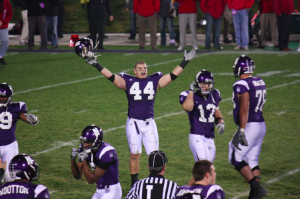 We all know that National Football League athletes suffer serious and debilitating injuries. Through the NFL Collective Bargaining Agreement and workers compensation benefits, professional football players are at the very least able to obtain some compensation for their injuries and for the disabilities associated with their time in the league.
We all know that National Football League athletes suffer serious and debilitating injuries. Through the NFL Collective Bargaining Agreement and workers compensation benefits, professional football players are at the very least able to obtain some compensation for their injuries and for the disabilities associated with their time in the league.
University athletes are given no such benefits, even thought they often suffer the same injuries as NFL players. They are not employees and as such, cannot be members of a union able to bargain for these benefits on behalf of these student-athletes. The benefits provided to student-athletes are dictated by the Universities and when it comes to their future health and welfare, little is offered. A student-athlete is provided health insurance while attending school, but the insurance expires upon graduation or if the student leaves school. There is nothing available to these athletes to cover their medical expenses or to compensate them for disabilities caused by injuries they sustained while playing college sports.
Universities act as athletes’ employers. They create their schedules, dictate when and where the practice and play games, decide what uniforms and practice gear they will wear and prescribe specific workout protocols and the results the athletes must attain. Universities “pay” athletes with scholarships often worth hundreds of thousands of dollars. The Universities “profit” countless millions of dollars from the athletes “work.” With all the aspects of an employer-employee relationship, these student-athletes should be provided with the same benefits as those provided to employees in traditional employment relationships.
Over a year ago, a group of Northwestern University football players attempted to change the way student athletes are classified. These student-athletes took the bold step to create a union. They petitioned the National Labor Relations Board [NLRB] and in March 2014 the NLRB regional director ruled in favor of the student-athletes. The NRLB ruled that athletes receiving scholarships from Northwestern were employees.
However, on Monday, August 17, the NLRB used its discretion to decline to exercise jurisdiction over the student-athlete’s petition to form a union. Northwestern University is one of 17 private Universities under the NCAA, which is comprised of 125 Division I schools. Because the other schools are public universities, they would be considered public employees and not within the NLRB’s jurisdiction. In declining to exercise jurisdiction over the players’ petition to unionize, the NLRB concluded that doing so would upset of the balance of competition amongst NCAA teams. Thus, the players’ fight to unionize has come to an abrupt end for now.
The decision by the NLRB to “punt” on the issue is fundamentally unfair to student-athletes and disregards the realities of college athletics. However, these athletes’ courage in seeking change in a fundamentally flawed system has not been without reward. Universities are beginning to increase athletes’ stipends, provide four-year scholarships, remove meal restrictions and there is the possibility of extended medical coverage. While these student-athletes may have lost the battle, it appears they may have won the war. Their efforts have led to changes not only at Northwestern, but to other collegiate athletics throughout the NCAA.
